| | | | | | | Presented By Babbel | | | | Axios World | | By Dave Lawler ·Jul 29, 2021 | | Welcome back to Axios World. - Thanks for welcoming me into your inbox. Tonight's edition is 1,790 words (7 minutes).
- Heads up: We'll be off next week but back and better than ever on Aug. 9.
New arrival? Subscribe. | | | | | | 1 big thing: Rich world's pandemic selfishness won't be forgotten | 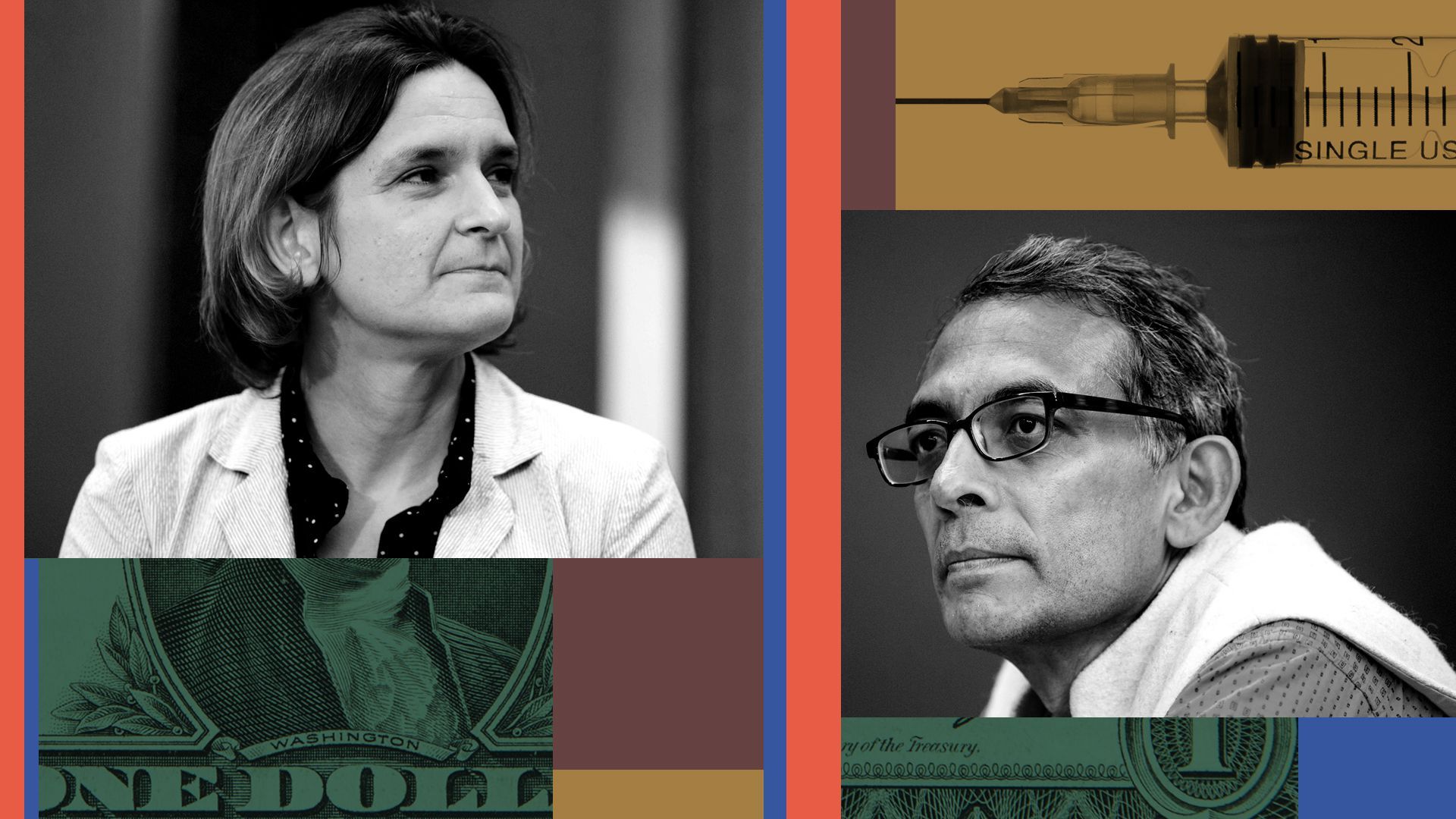 | | | Photo illustration: Sarah Grillo/Axios. Photos: Scott Eisen/Getty Images | | | | The failure of rich countries to share vaccines and financial assistance with poorer ones during the pandemic will exacerbate the rise in global poverty and could come back to bite them, Nobel Prize-winning economists Esther Duflo and Abhijit Banerjee tell Axios. Why it matters: Duflo initially believed the pandemic would produce a "more cooperative world order" as rich countries felt compelled to show solidarity with the developing world, potentially boding well for future collaboration on issues like climate change. Now she fears the opposite. - With the critical COP26 climate summit approaching and "the rich world so brilliantly demonstrating how it doesn't care about one thing besides itself," Duflo says, "you could imagine a developing country to come very uninterested in doing their bit."
- "There's very significant resentment that has built up," Banerjee adds, referring to the hoarding of vaccines by rich countries. "It seems to me there will be a reckoning. I'm not sure in the end where that will land."
Duflo and Banerjee — MIT professors known for their work on poverty, and also a married couple — have long advocated steps like the direct cash transfers many countries have employed to support the poor during the pandemic. But they note that poorer countries found their hands tied. - Several countries, including Togo, developed mobile payments systems to carry out such transfers but lacked the funds to make full use of them.
- Rich countries have spent more than 20% of GDP on average on financial support during the pandemic, Duflo notes. Developing countries, operating under tighter fiscal constraints, managed just 2%.
- Extreme poverty rose around the world last year for the first time since 1997, with an additional 120 million people falling into extreme poverty, per a World Bank estimate.
Driving the news: The IMF this week revised its 2021 growth projections upward for rich countries and downward for developing countries. Low vaccination rates have tempered hopes that low-income economies would come roaring back and the increase in poverty would be quickly erased. - Most people who have fallen into poverty during the pandemic were already in fairly precarious positions, living off their weekly earnings in industries like construction, transportation or agriculture, Banerjee says. For millions, that income dried up during the pandemic.
- "One could imagine a very fast revival," he says, as such industries ramp back up — but that won't be fully possible without widespread access to vaccines. Meanwhile, countries like Indonesia and Bangladesh are still having to choose between spikes in hunger or in cases.
- Banerjee is particularly worried about the implications of school closures that are now dragging into a second year. "We know that one year of school increases lifetime earnings by 7%," and that many kids who leave the classroom for two years will never return, he says.
Duflo and Banerjee contend that rich countries now have an enormous opportunity to expand access to vaccines and, with interests rates low and economic growth booming, to increase their aid to developing countries. - "Nobody is talking of expanding aid. I think the psychology, unfortunately, in rich countries somehow — even though the U.S. is going to grow faster in this year than it has in modern memory — is that we are in dire straits and we need to keep resources," Banerjee says.
- "I find it extremely depressing, I must say. The reaction seems just mean-spirited."
Worth noting: Rich countries including the U.S. are now donating doses, but have moved fairly cautiously while also buying up additional supply for potential boosters at home. - Duflo and Banerjee also lament the slow progress on providing cash flow to developing countries via "special drawing rights" at the IMF.
|     | | | | | | 2. State of the outbreak: EU passes U.S. on vaccinations |  Data: Our World in Data; Chart: Axios Visuals 1. Despite a big head start, the U.S. has now administered fewer vaccinations per 100 residents than the EU. - Flashback: The EU initially had major struggles with supply and deep concerns about vaccine hesitancy.
- Supply is no longer a problem and demand has increased, particularly as countries like France and Italy start requiring vaccines or negative tests to dine indoors.
- Yes, but: The U.S. continues to ban non-citizens from entering the country from the EU even as vaccinated Americans can visit Europe. European leaders are pressing the Biden administration to change that.
- The latest: England is lifting its quarantine requirement for vaccinated EU and U.S. citizens.
2. Israel will begin offering a third shot of the coronavirus vaccine to people over the age of 60 starting Sunday. - Why it matters: Boosters are coming, though the data is mixed on when or whether they're needed. That's likely bad news for poor countries that were hoping global supply would be opening up.
3. Already contending with one of the worst coronavirus spikes anywhere in the world, Malaysia is also facing a political crisis. - Prime Minister Muhyiddin Yassin unilaterally canceled the country's state of emergency, set to expire on Aug. 1, leading to a rare rebuke from the king, who said he hadn't been consulted
- What to watch: The state of emergency had allowed Muhyiddin to suspend parliament, which is crucial as it's unclear whether he commands a majority. He's facing growing calls to resign.
|     | | | | | | 3. COVID-denying countries change their tune | 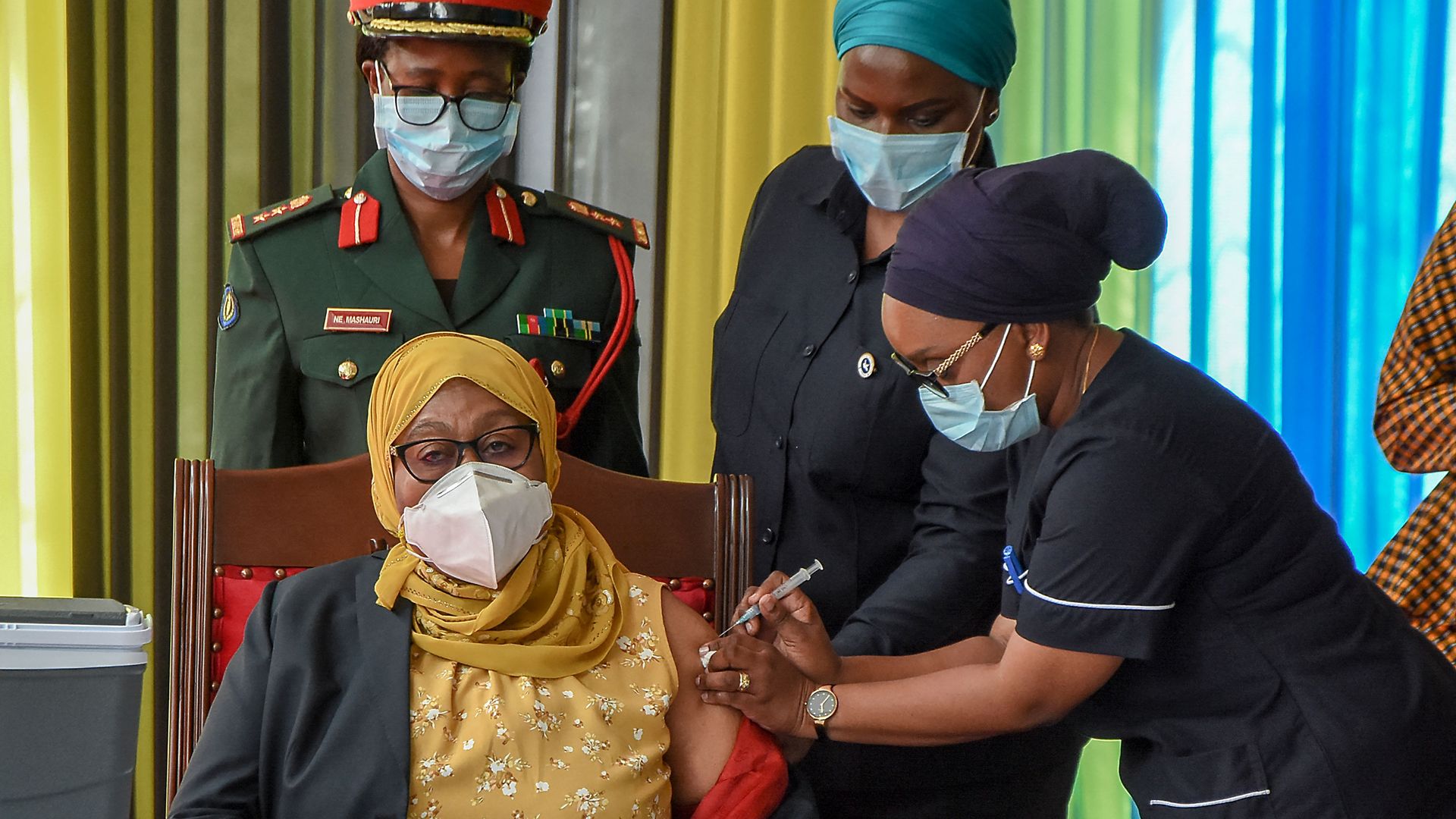 | | | Samia Suluhu Hassan gets the shot. Photo: Stringer/AFP via Getty Images | | | | Tanzanian President Samia Suluhu Hassan was vaccinated live on TV on Wednesday to kick off the country's belated vaccination campaign, urging others to get the shot as well. Why it matters: It's hard to imagine a sharper contrast with her predecessor, John Magufuli, who claimed Tanzania didn't need vaccines because it had already defeated the virus through prayer. He died in March, possibly of coronavirus. - Yes, but: Hassan seems not to have broken entirely from Magufuli's authoritarian approach to governance. The chairman of the East African country's leading opposition party was recently arrested on terrorism charges.
Tajikistan's government has also backed off its claim that the country is virus-free — a position that grew harder to maintain as so many close associates of President Emomali Rahmon became infected. - Driving the news: After Rahmon's sister died of the virus, her sons beat up the health minister and a doctor, according to local media reports.
- The deputy health minister acknowledged on Monday that the Delta variant was spreading in the country. He did not say why his boss hadn't turned up for the briefing.
North Korea has still not acknowledged any coronavirus cases, but the need for aid amid a COVID-related economic crisis may have motivated Kim Jong-un to renew contacts with South Korean President Moon Jae-in. - The sides reconnected a military hotline on Tuesday and are now discussing a potential summit, Reuters reports.
- The state of play: Kim has referenced the country's economic hardship in public statements, and said last month that there had been a "great crisis" in the country's efforts to keep the virus out.
|     | | | | | | A message from Babbel | | How Babbel trains your brain to learn a new language | | |  | | | | Unlike other apps that use machine learning to teach you languages, Babbel takes a human-based approach. What this means: Lessons are built by over 150 linguists and prepare you for situations you'll actually encounter in real-life. No random words or abstract grammar. Sign up and get 55% off. | | | | | | Bonus: Where in the world? |  | | | Screengrab via Apple Maps | | | | The landmarks marked with the red and purple pins are in the same city but in different countries. Can you name them? Scroll to the bottom for an answer. |     | | | | | | 4. Peru's "peasant president" sends mixed signals | 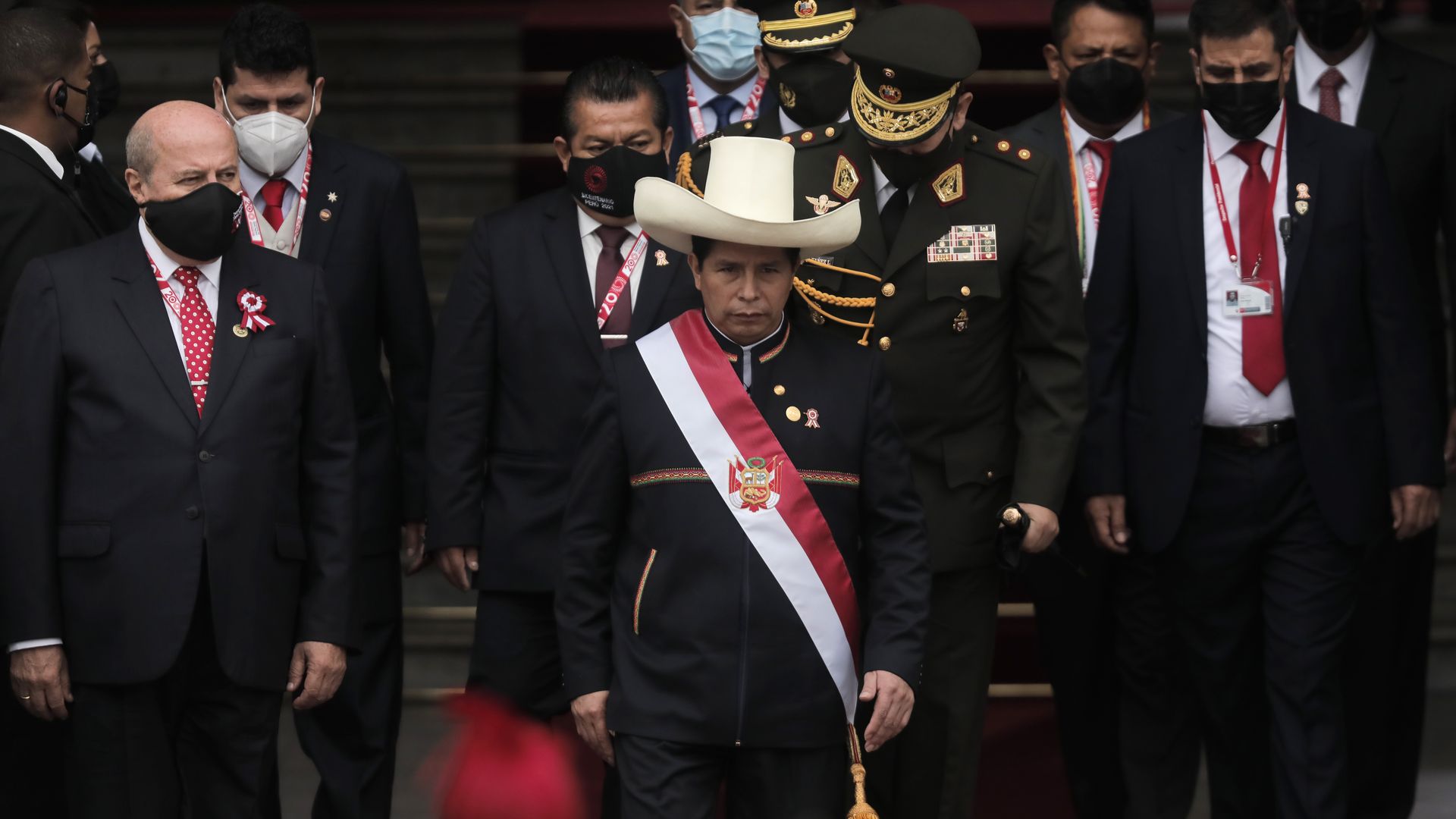 | | | Peruvian President Pedro Castillo (C) at his inauguration. Photo: Getty Images. | | | | Peruvian President Pedro Castillo said at his inaugural speech on Wednesday that his taking office marks "the first time that this country will be governed by a peasant." Why it matters: The left-wing former schoolteacher signaled in the speech that he stands with Peruvians who are facing hardship and discrimination, while also reassuring foreign investors who may be poised to flood out of the country at the first whiff of nationalization. What he's saying: Castillo said he would not live in the presidential palace — known as the "House of Pizarro — and referred back to Peru's painful colonial legacy in his speech: "The defeat of the Inca Empire gave rise to the colonial era, it was then... that the castes and differences that persist to this day were established." - Castillo said in the speech that he had no plans to nationalize Peruvian industry, but his proposals to reform the constitution have worried investors abroad and conservatives at home, some of whom have warned of a "new Venezuela."
Driving the news: Castillo named a member of his own Marxist party as prime minister today. He's expected to pick a more moderate economist as finance minister. |     | | | | | | 5. What I'm reading: How China goes for the gold | 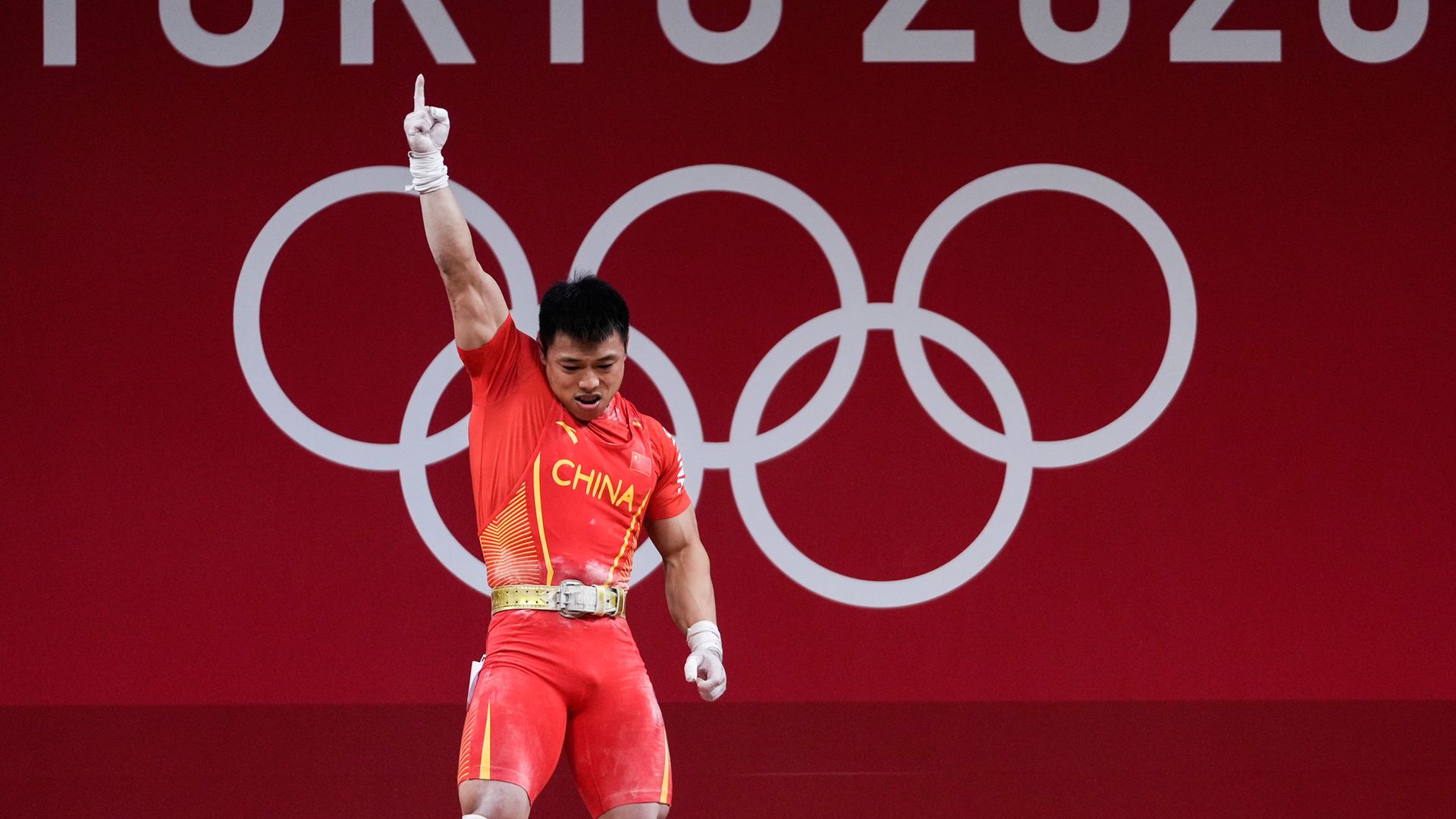 | | | Weightlifter Chen Lijun takes the gold. Photo: Wei Zheng/ChinaSports/VCG via Getty | | | | China is currently tied with Japan for the most gold medals at the Olympics, one ahead of the U.S. What I'm reading: As the NYT's Hannah Beech writes, China's emergence as an Olympic superpower followed decades of planning by the government. Before winning gold on Saturday, Beech writes, weightlifter Hou Zhihui trained six days a week, away from her family, from the age of 12. - "Rooted in the Soviet model, the Chinese system relies on the state to scout tens of thousands of children for full-time training at more than 2,000 government-run sports schools," Beech writes.
- "To maximize its golden harvest, Beijing has focused on less prominent sports that are underfunded in the West or sports that offer multiple Olympic gold medals."
- Two-thirds of China's golds have come from women, and most from sports "that can be perfected with rote routines, rather than those that involve an unpredictable interplay of multiple athletes."
- "For every Olympic champion, tens of thousands of other children would not make it. For these castoff athletes, life is often difficult: little education, damaged bodies, few career prospects outside the sports system."
What to watch: As China grows wealthier, parents are less willing to enroll their children in this system, Beech writes. |     | | | | | | 6. Summer reading from Axios Latino |  | | | Photo illustration: Sarah Grillo/Axios. Photos: David Levenson, Ray Tang/Anadolu Agency/Getty Images | | | | There's a new boom in Latin American literature, and it's being led by women, my colleague Marina E. Franco writes in her Axios Latino newsletter. The big picture: Gone are the whimsical elements in favor of suspense, the gothic and the noir. Go deeper for more summer reading recommendations. |     | | | | | | 7. Stories we're watching | 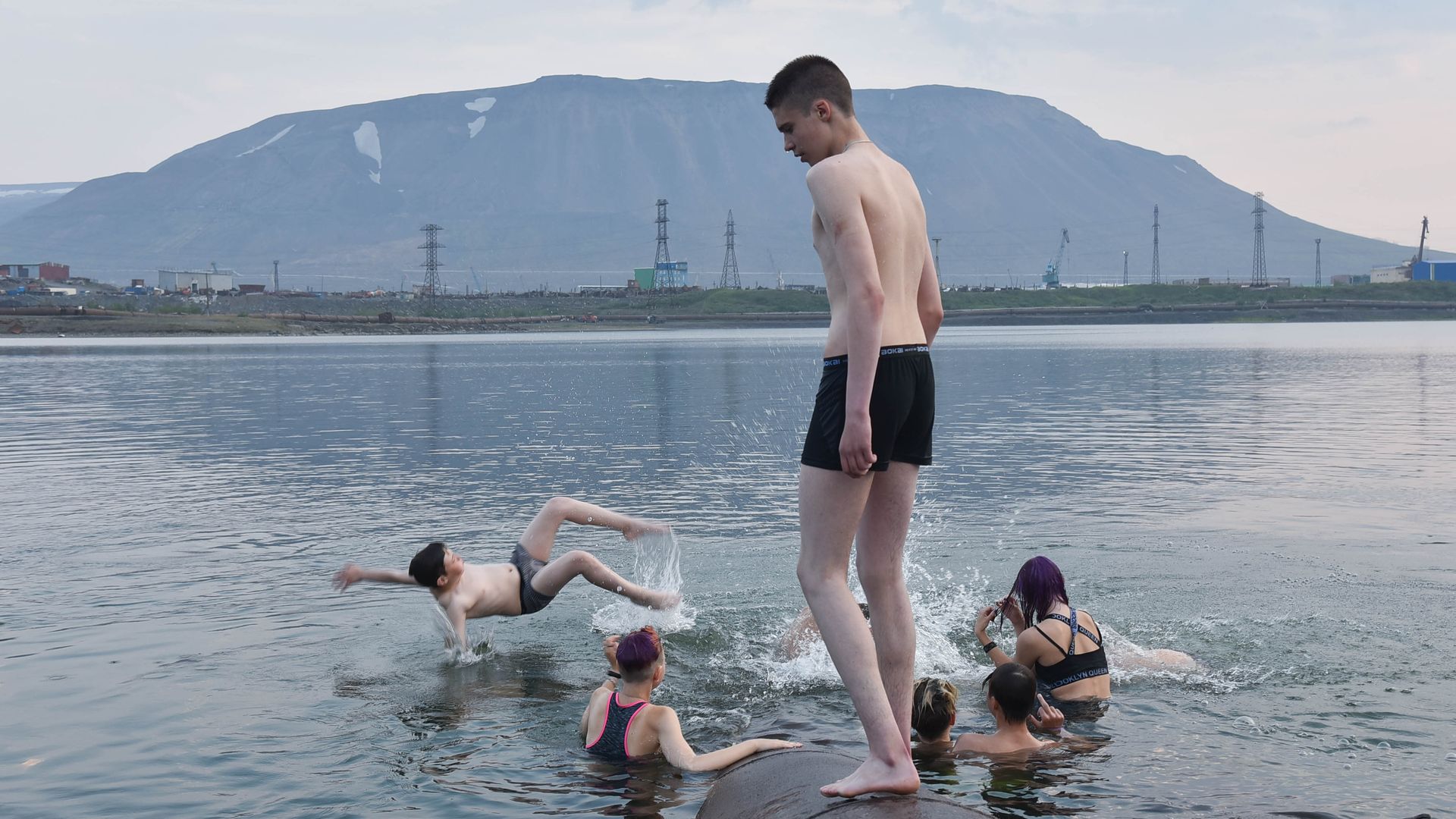 | | | Making the most of a heat wave in Norilsk, Northern Siberia. Photo: Denis Kozhevnikov/TASS via Getty Images | | | - U.S. warns Iran's new government it won't get a better deal
- Swastika found in State Department elevator
- Flooding in Rohingya refugee camps displaces thousands
- Biden meets Belarusian opposition leader
- Guilty verdict in first Hong Kong security law trial
- Israel weighs return to UNESCO
- Ex-intel analyst sentenced for leaking secret drone info
Quoted: "I felt the need. Until now, however, my voice was not as loud as it is now." — Polish rower and silver medalist Katarzyna Zillmann, who came out as gay by thanking her girlfriend in a post-race interview with state TV. That put Poland's right-wing government in an awkward spot. |     | | | | | | A message from Babbel | | The app that'll teach you a new language in 3 weeks | | |  | | | | Babbel makes it easy with bite-sized lessons, so you can spend less than 10 mins a day learning language skills you'll remember. In fact, 73% of users said they could have a simple conversation in their new language after just 5 hours of lessons. Sign up today and get 55% off one of 14 languages. | | | | Answer: The Colosseum (red pin) and St. Peter's Square (purple pin) in Vatican City. |  | | It'll help you deliver employee communications more effectively. | | | | | | Axios thanks our partners for supporting our newsletters. If you're interested in advertising, learn more here.
Sponsorship has no influence on editorial content. Axios, 3100 Clarendon Blvd, Suite 1300, Arlington VA 22201 | | | You received this email because you signed up for newsletters from Axios.
Change your preferences or unsubscribe here. | | | Was this email forwarded to you?
Sign up now to get Axios in your inbox. | | | | Follow Axios on social media:    | | | | | |













No comments:
Post a Comment